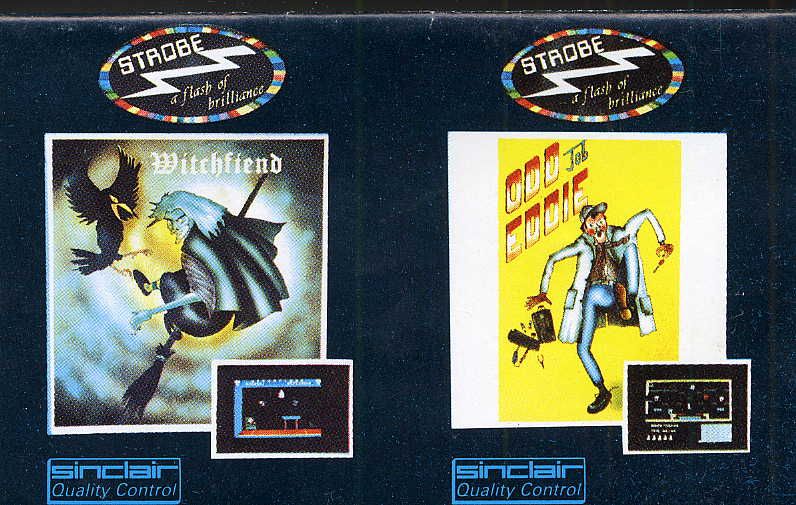Retro Replay Review
Gameplay
The double pack of Witchfiend and Odd Job Eddie delivers two distinct action experiences that showcase the breadth of Strobe’s design philosophy on the 128K Spectrum. In Witchfiend, players guide a young witch through winding corridors filled with prowling demons and elemental traps. The responsive controls make spellcasting feel immediate and satisfying, as timing your jumps and incantations is key to surviving each level. Combat hinges on mastering a small roster of magical attacks, each with a limited charge that encourages strategic use.
(HEY YOU!! We hope you enjoy! We try not to run ads. So basically, this is a very expensive hobby running this site. Please consider joining us for updates, forums, and more. Network w/ us to make some cash or friends while retro gaming, and you can win some free retro games for posting. Okay, carry on 👍)
Odd Job Eddie offers a lighter, more humorous tone, tasking players with completing a variety of occupational mini-challenges. From window washing atop skyscrapers to repairing broken pipes in a labyrinthine hotel, each job introduces unique platforming mechanics. While some tasks lean toward pattern memorization, the sense of progression—unlocking new tools and abilities—keeps the gameplay loop engaging. The pacing is brisk, and short load times on the 128K Spectrum help maintain momentum.
Both titles benefit from thoughtful design: Witchfiend’s levels are packed with hidden passages and secret items, rewarding exploration, while Odd Job Eddie’s randomized job assignments add replayability. Though brief by modern standards, each game balances challenge with fairness; sudden spikes in difficulty are offset by generous checkpointing on more punishing stages. Overall, players seeking varied action fares get two solid entries for the price of one.
Graphics
On the Spectrum’s limited palette, Witchfiend impresses with its moody dungeon environments and detailed sprite work. The titular witch character is fluidly animated, her robes and hair flowing dynamically as she moves. Background textures, from dripping cave walls to eldritch altars, are rendered with clever dithering that conveys depth despite the hardware’s constraints. Enemy designs stand out in contrasting hues, making it easy to differentiate between projectiles and hazards.
Odd Job Eddie takes a different approach, favoring bright, cartoon-like visuals that underscore its comedic premise. Each job location features distinct color schemes and background elements: neon-lit windows for the window-washing challenge, pixel-art plumbing fixtures for the “fix the pipes” stage, and so forth. Eddie himself is a charismatic sprite, complete with exaggerated gestures that add personality to mundane tasks. Occasional flicker can be observed when multiple moving elements overlap, but it rarely disrupts gameplay.
Across both titles, the 128K memory upgrade allows for richer palettes and smoother animations compared to 48K counterparts. Transitions between screens are accompanied by simple but effective loading screens that display thematic artwork—an appreciated touch that sets the mood. While neither game shatters modern graphical expectations, they excel at maximizing the Spectrum’s capabilities to deliver distinctive and appealing visuals.
Story
Witchfiend’s narrative is straightforward yet atmospheric: the realm of Eldrath has been overrun by demonic forces, and only a novice witch with latent powers can restore balance. Story progression is conveyed through brief in-game captions at key checkpoints, revealing fragments of lore and deepening the sense of peril. Though minimalistic, this approach works well within the action-focused structure, providing just enough context to motivate each dungeon descent.
Odd Job Eddie opts for humor over gravitas, framing its plot around a hapless everyman who must raise funds by taking on odd jobs around town. Each assignment is prefaced by a tongue-in-cheek briefing—“Your boss insists the windows sparkle like diamonds!”—which sets a lighthearted tone. The game’s self-awareness shines through in its playful pokes at occupational clichés and the absurdity of Eddie’s escalating tasks.
Neither title strives for epic storytelling, but both use their narratives effectively to support gameplay. Witchfiend’s sparse mythos heightens the supernatural dread, while Odd Job Eddie’s comedic setup keeps players smiling as they leap between precarious ledges. Fans of retro gaming will appreciate the concise storytelling that complements rather than overshadows the action.
Overall Experience
Combining Witchfiend and Odd Job Eddie into a single 128K double pack is a savvy move by Strobe, offering two distinct flavors of action for Spectrum enthusiasts. Witchfiend delivers a more serious, exploration-driven adventure that tests reflexes and spell management, while Odd Job Eddie keeps things fresh with its whimsical mini-games and job-hopping premise. Together, they provide hours of varied entertainment without feeling redundant.
Technically, both games demonstrate polished programming: load times are minimal, controls are responsive, and memory management ensures a relatively smooth experience even in more intense sequences. The increased color palettes and animations made possible by the 128K upgrade are put to good use, making this compilation a showcase of the Spectrum’s untapped potential beyond the standard 48K titles.
For collectors and retro gamers alike, Witchfiend / Odd Job Eddie represents excellent value. It not only encapsulates the charm and limitations of early ’80s home computing but also proves that innovative design and engaging mechanics can thrive within such constraints. Whether you’re delving into the dark halls of Eldrath or scaling skyscrapers as an overqualified handyman, this double pack offers a satisfying journey through two sides of action gaming history.
 Retro Replay Retro Replay gaming reviews, news, emulation, geek stuff and more!
Retro Replay Retro Replay gaming reviews, news, emulation, geek stuff and more!




Reviews
There are no reviews yet.